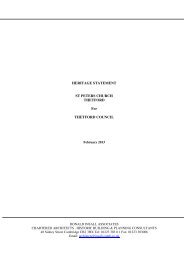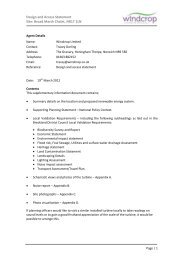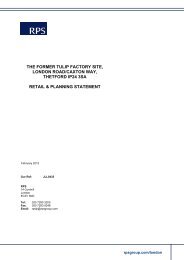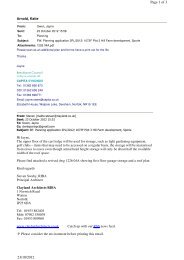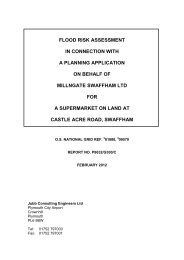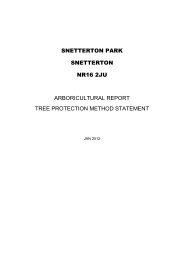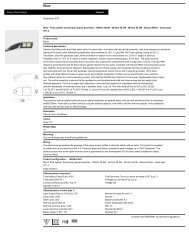Design and Access Statement Site: Lyng Farm, NR20 4JE
NR20%204JE%20Design%20and%20Access%20Statement.pdf
NR20%204JE%20Design%20and%20Access%20Statement.pdf
You also want an ePaper? Increase the reach of your titles
YUMPU automatically turns print PDFs into web optimized ePapers that Google loves.
<strong>Design</strong> <strong>and</strong> <strong>Access</strong> <strong>Statement</strong><br />
<strong>Site</strong>: <strong>Lyng</strong> <strong>Farm</strong>, <strong>NR20</strong> <strong>4JE</strong><br />
Local Validation Requirements<br />
In preparing this section of the documentation, the Breckl<strong>and</strong> District Council Local Validation<br />
Requirements have been reviewed <strong>and</strong> information is provided in all relevant categories.<br />
Economic <strong>Statement</strong>:<br />
The wind turbine is expected to generate an average of 11.66 MWh of electricity each year,<br />
equivalent to a saving of 6.26 tonnes of carbon dioxide. This yield data has been calculated<br />
from the Small Wind Turbine Yield Calculator, jointly developed by the Carbon Trust <strong>and</strong><br />
Renewable UK (formerly BWEA) <strong>and</strong> which is widely recognised as the most accurate yield<br />
forecast tool available. In particular it has addressed many of the issues of overoptimistic yield<br />
forecasts from earlier tools which did not take account of local geographic conditions.<br />
This installed capacity will also help to contribute towards regional targets for renewable<br />
energy generation included in the UK Low Carbon Transition Plan.<br />
Biodiversity:<br />
A site check has been made using the Multi Agency Geographic Information for the<br />
Countryside Interactive Map (MAGIC), managed by Natural Engl<strong>and</strong> on behalf of DEFRA. The<br />
site is not situated in a protected habitat area, nor is it located close to one.<br />
In addition, the proposed site has been assessed in accordance with guidelines for the siting of<br />
small wind turbines, prepared by an established independent ecological consultant, so as to<br />
minimise risks to protected species. The site assessment considers features which may be<br />
used by bats or birds, <strong>and</strong> takes account of the available guidance in relation to the siting of<br />
small wind turbines. These features comprise trees, hedgerows, ponds <strong>and</strong> waterways,<br />
including permanently wet ditches. A micro turbine on or close to any hedgerow or linear<br />
feature may increase the likelihood of an effect on bat populations. The relationship to<br />
connective habitat is also taken into consideration, as many species of bats follow linear<br />
features when travelling between foraging sites <strong>and</strong> a roost. Isolated or fragmented habitat<br />
features are less likely to be used by bats as they provide little cover or foraging potential.<br />
Bats roost in a wide range of buildings <strong>and</strong> all buildings except those constructed from nontraditional,<br />
modern or pre-fabricated materials, are considered as potential bat roosts. Large<br />
mature trees (girth greater than 300cm) are also potentially suitable as roost sites.<br />
Particular attention has been paid to ensuring that the site is an appropriate distance from<br />
potential bat habitats <strong>and</strong> roost sites. There are no known bat roosts or buildings that could<br />
potentially become bat roosts within 50 metres of the site, <strong>and</strong> the closest potential foraging<br />
feature is located over 25m from the turbine. No trees, hedgerows or scrub will be affected by<br />
the installation <strong>and</strong> the turbine is not expected to disturb any ground dwelling fauna. Hence<br />
the risk of harm to protected species is considered minimal.<br />
L<strong>and</strong>scape <strong>and</strong> visual impact:<br />
The site is not situated in an Area of Outst<strong>and</strong>ing Natural Beauty. Care has been taken to<br />
minimise the l<strong>and</strong>scape <strong>and</strong> visual impact, <strong>and</strong> views from adjacent receptors have been<br />
considered. Images of the site <strong>and</strong> surrounding area are provided at Appendix C <strong>and</strong> a<br />
visualisation of the turbine viewed from approximately 100 m is provided at Appendix D. No<br />
significant l<strong>and</strong>scape or visual issues have been identified.<br />
Page | 8



